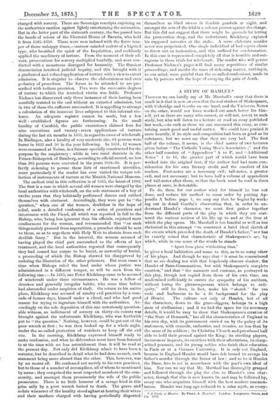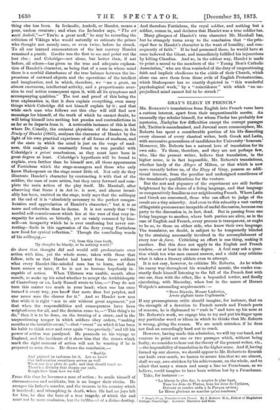A STUDY OF HAMLET.* Tilouon we can hardly say of
Mr. Marshall's essay that there is much in it that is new, or even that the real student of Shakespeare, with Coleridge and Goethe on one hand, and the Variorum Notes on the other, would not have worked out much better for him- self, yet as there are many who cannot, or will not, resort to such study, but who will listen to a lecture or read an essay published last week,—to such as these we can commend this essay, as con- taining much good and useful matter. We could have praised it more heartily, if its style and composition had been as good as its substance, but we must say that they are very bad. The first half of the volume, it seems, is the chief matter of two lectures given before "The Catholic Young Men's Association ;" and the other half consists of " Appendices" A to P, and "Additional Notes" 1 to 16, the greater part of which would have been worked into the original text, if the author had had more con- sideration for his own literary credit and the comfort of his readers. Foot-notes are a necessary evil; tail-notes, a greater evil, and not necessary; but to have half a volume of appendices and tail-notes after those, so that the book must be read in three places at once, is detestable.
To do, then, for our author what for himself he has not done, and reduce his method to some order by putting Ap- pendix A before page 1, we may say that he begins by work- ing out in detail Goethe's observation that, in order to un- derstand Hamlet's character, we must first gather together from the different parts of the play in which they are scat- tered the various notices of his life up to and at the time at which the play opens. Mr. Marshall is too fanciful as well as too rhetorical in this attempt "to construct a brief ideal sketch of the events which preceded the death of Hamlet's father," nor has he exactly seized that characteristic of Shakespeare's art, by which, while in one sense of the words he stands
"Apart from placo, withholding time," he gives a local habitation and name to this, as to so many other of his plays. And though he says that " it must be remembered that we are dealing not with that hopelessly obscure shadow, the Hamlet of Saxo-Grammaticus, but with Shakespeare's complete creation," and that " the manners and customs, as portrayed in this play, though not copied from those of his own time, are modernised sufficiently to ensure the sympathy of his auditors, without losing the picturesqueness which belongs to anti- quity," still he does, in fact, make his " sketch " far too rude and barbarous to be a fit background for the play of Hamlet. The culture not only of Hamlet, but of all the characters, down to the grave-diggers, belongs to a high state of civilisation ; and if we bad the space for the necessary details, it would be easy to show that Shakespeare's creation of "the State of Denmark," has all the characteristics of England in his own day, with its government carried on by the policy of its statesmen, with councils, embassies, and treaties, no less than by the arms of its soldiers ; its Christian Church and priesthood half able to hold their ground against the King ; its strolling players, its coroners' inquests, its courtiers with their affectations, its sharp- witted peasants, and its young nobles who finish their education in Paris or at a German University. It is only not England, because in England Hamlet would have felt bound to avenge his father's murder through the forms of law ; and so he is Hamlet the Dane, free to act in accordance with the poet's own ideal of him. Nor can we say that Mr. Marshall has thoroughly grasped and followed through the play the clue to Hamlet's own char- acter, though that clue is now known to, and may be followed by, every one who acquaints himself with the best modern commen- tators. Hamlet was long ago reduced to a solar myth, as every- • A Study of Hamlet. By Frank A, Marshall. London: Looming, Green, and Co. 1875. thing else has been. In Icelandic, Amlodi, or Hamlet, means a poor, useless creature ; and when the Icelander says, " Thu ert laud Amlodi,"—" You're a great muff," he may be recording the criticism of Vikings who would naturally so estimate the prince who thought not merely once, or even twice, before he struck. To all our learned commentators of the last century Hamlet remained a puzzle. Goethe was the first to see and point out the lost clue ; and Coleridge—not alone, but better than, if not before, all others—has given us the true and adequate explana- tion of Hamlet's character, as being that of a man in whose mind there is a morbid disturbance of the true balance between the im- pressions of outward objects and the operations of the intellect and imagination, and in which, therefore, we " see a great, an almost enormous, intellectual activity, and a proportionate aver- sion to real action consequent upon it, with all its symptoms and accompanying qualities." The test and proof of this being the true explanation is, that it does explain everything, even many things which Coleridge did not himself explain by it; and that while each man who follows out this clue will still find new meanings for himself, of the truth of which he cannot doubt, he will bring himself into nothing but puzzles and contradictions in as far as he departs from it. A noticeable instance of this is that where Dr. Conolly, the eminent physician. of the insane, in his. Study,of Hamlet (1863), analyses the character of Hamlet by the light of his own practical experience of all forms of madness, and of the state in which the mind is just on the verge of mad- ness, this analysis is constantly found to run parallel with Coleridge's a priori conclusions, as they must have been in great degree at least. .Coleridge's hypothesis will be found to explain, even farther than he himself saw, all those appearances of Fortinbras which the stage-managers and those who only know Shakespeare on the stage count little of. Not only do they illustrate Hamlet's character by contrasting it with that of the soldier, the man of mere action, but they carry forward and com- plete the main action of the play itself. Mr. Marshall, after observing that Scene 4 in Act iv. is now, and almost invari- ably has been, omitted on the stage, truly says that the soliloquy at the end of it is "absolutely necessary to the perfect compre- hension and appreciation of Hamlet's character;" but it is so more and otherwise than he deems. It is not merely that "the: morbid self-consciousness which lies at the root of that very in capacity for action so bitterly, yet so vainly censured by him- self—an incapacity which he is ever confessing but never cor- recting—finds in this aggression of the fiery young Fortinbras new, food for cynical reflection." Though the concluding words
of his soliloquy,—
"0, from this time forth.
My thoughts be bloody, or be nothing worth!"
do show that thought did and would still predominate over action with him, yet the whole scene, taken with those that follow, tells us that Hamlet had learnt from these soldiers what every Hamlet-like-minded man has to learn, and does learn sooner or later, if he is not to become hopelessly in- capable of action. When Tillotson was unable, month after month, to make up his mind whether to accept the Archbishopric of Canterbury or no, Lady Russell wrote to him,—" Pray do not turn this matter too much in your head.; when one has once turned it every way, you kno' that more does but perplex, and one- never sees the clearer for it." And so Hamlet now sees that while it is right " not to stir without great argument," yet that when the responsibilities and consequences have been weighed once for all, and the decision come to,—" This thing's to do," then it is to be done, on the turning of a straw, and in the unquestioning temper in which soldiers obey orders, " making mouths at the invisible event,"—that " event " on which it has been his habit to think over and over again "too precisely," and till his power of action was paralysed. He proceeds on his voyage to England, and the incidents of it show him that the straws which mark the right moment of action will not be wanting if he is prepared to seize them. He draws the conclusion,—
"Rashly,
And praised be rashness for it. Let us know Our indiscretion sometimes serves us well When our dear plots do pall; and that should teach us There's a divinity that shapes our ends, Rough-hew them how we will."
From this time he becomes a man of action ; he avails himself of circumstances and accidents, but is no longer their victim. He avenges his father's murder, and the treason to his country which it involved ; and triumphing in death, when life had no joys left for him, he dies the hero of a true tragedy, of which the end must not be mere confusion, but the fulfilment of a divine destiny. And therefore Fortinbras, the royal soldier, and nothing but a soldier, comes in, and declares that Hamlet was a true soldier too.
Many glimpses of Hamlet's true character Mr. Marshall has, but he strangely turns away to the conclusion that " the prin- cipal flaw in Hamlet's character is the want of humility, and con- sequently of faith." If he had possessed these, he would have at once believed the Ghost, and immediately fulfilled his injunctions by killing Claudius. And so, in the oddest way, Hamlet is made to point a moral to the members of the " Young Men's Catholic Association," who are thus reminded of the duty of unquestioning faith and implicit obedience to the eidola of their Church, which alone can save them from those evils of English Protestantism, which Shakespeare has so exactly depicted in " this wonderful psychological work," by a " coincidence " with which "an un- prejudiced mind cannot fail to be struck !"



































 Previous page
Previous page